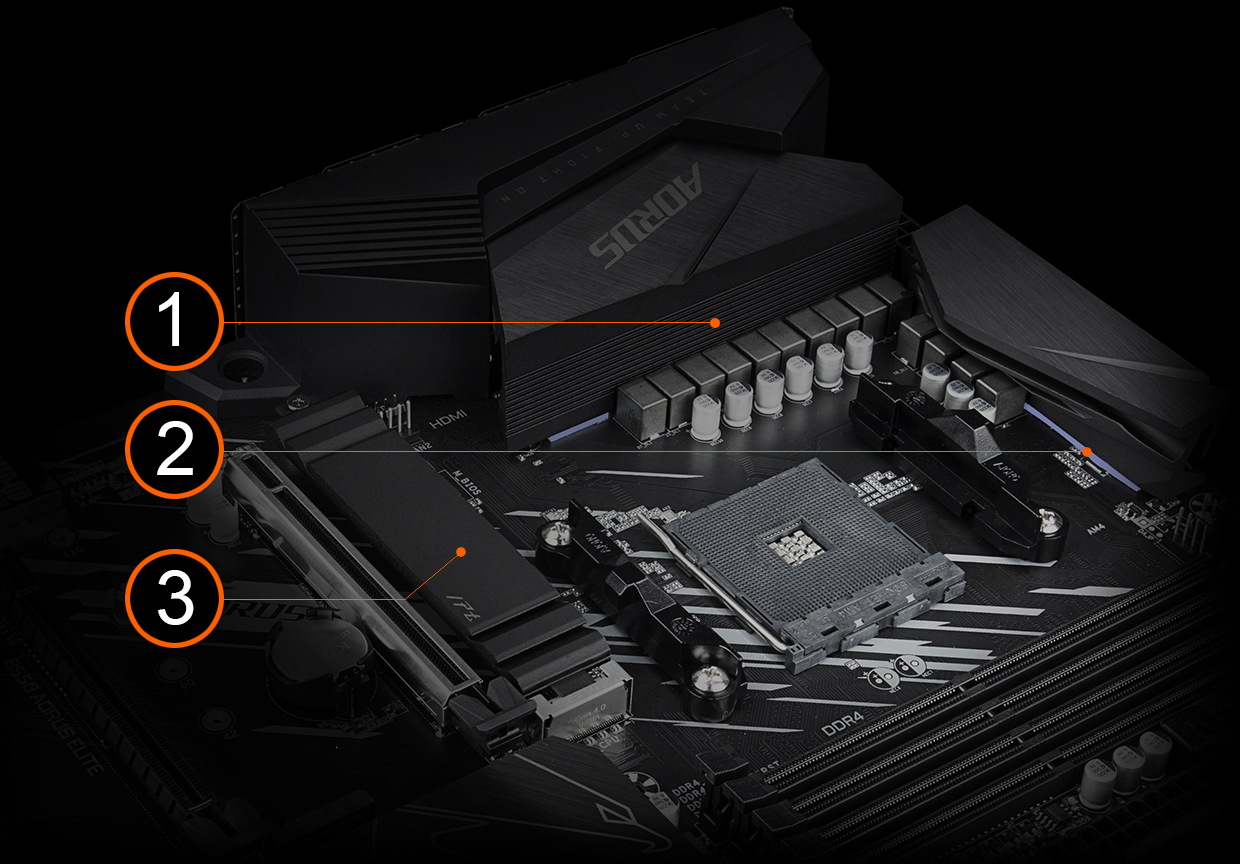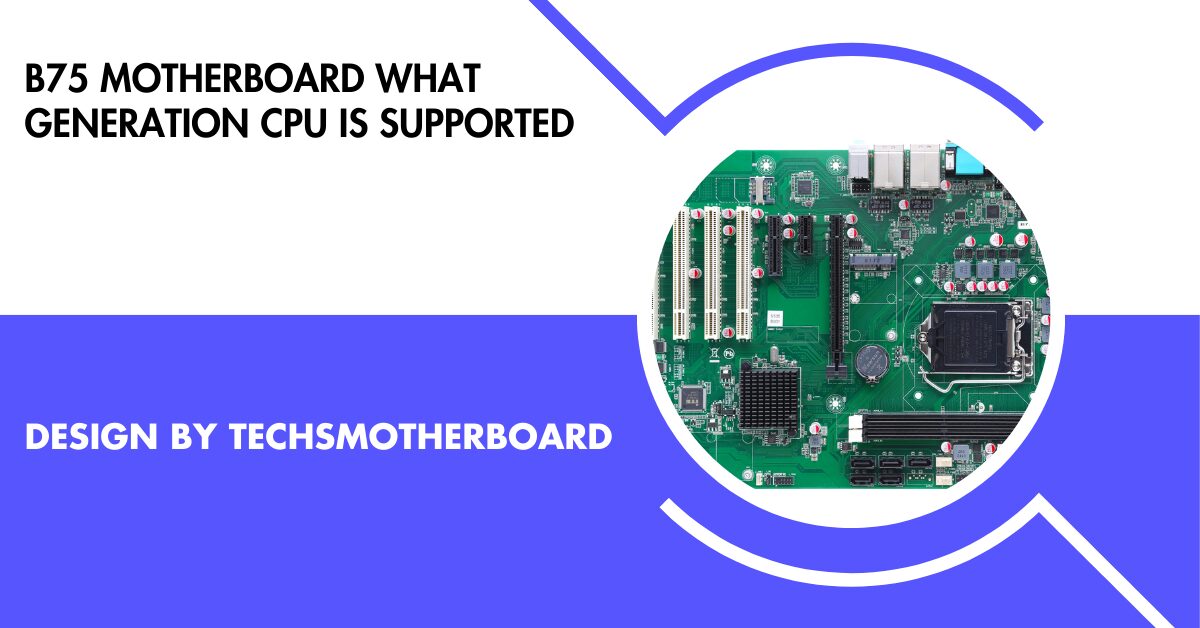Blog
What’s a Good Motherboard for Gaming – Top Picks for Every Budget!

A good gaming motherboard ensures CPU compatibility, quality chipsets, PCIe slots, fast RAM support, and overclocking options, with top choices being ASUS ROG Crosshair X670E Hero for high-end builds and Gigabyte B550 Aorus Elite V2 for budget gaming PCs.
The motherboard is the backbone of your system, connecting all the critical parts like the CPU, GPU, RAM, and storage. But with so many options available, it can be hard to determine what makes a motherboard good for gaming. In this guide, we’ll cover the key factors to consider when selecting a gaming motherboard and highlight some of the best options on the market.
What to Look for in a Gaming Motherboard?

Before diving into specific models, it’s important to understand the essential features and specifications that make a motherboard good for gaming. Here are the key factors to consider:
Socket Compatibility:
The first thing you need to check is the CPU socket type, which must match the processor you plan to use. Intel and AMD have different socket types, with Intel currently using LGA1200 and LGA1700 for their latest CPUs, while AMD uses AM4 and AM5. Choosing a motherboard with the correct socket ensures your CPU will fit and function properly.
Chipset:
The chipset determines how many features and connectivity options are available on the motherboard. For Intel, gaming motherboards with chipsets like Z790 or Z690 are highly recommended, while for AMD, the B550 or X670 chipsets are ideal for gaming builds. Higher-end chipsets offer more USB ports, PCIe lanes, and support for overclocking.
PCIe Slots:
For gaming, you’ll want a motherboard that has at least one PCIe x16 slot, which is where your GPU will go. PCIe 4.0 is the current standard for high-end graphics cards, offering faster data transfer speeds compared to PCIe 3.0. Some motherboards are starting to offer PCIe 5.0 slots, which are more future-proof.
Memory Support (RAM):
Most modern gaming motherboards support DDR4 RAM, but newer models are moving towards DDR5 for faster performance and better future-proofing. Make sure the motherboard supports at least 16GB of RAM (the minimum for gaming) and offers multiple slots, allowing you to upgrade to 32GB or more if needed.
Expansion Slots and Ports:
A good gaming motherboard should offer multiple expansion slots and a variety of USB ports. This ensures you can connect all your peripherals, like gaming keyboards, mice, and external storage devices. USB 3.2 and USB-C ports are highly recommended for fast data transfers.
Overclocking Support:
For gamers who want to push their hardware to the limit, overclocking is a must. Make sure the motherboard supports overclocking if you’re using a K-series Intel CPU or a Ryzen chip from AMD. Higher-end motherboards often feature better power phases and VRMs (Voltage Regulator Modules), making them more stable during overclocking.
Form Factor:
Motherboards come in different sizes, with ATX being the standard for most gaming builds. However, if you’re building a compact gaming PC, you might opt for a Micro-ATX or Mini-ITX motherboard. Ensure that the motherboard you choose fits inside your case and leaves room for airflow.
Read More: How to Check Your PC Motherboard – A Complete Guide!
Top Recommended Gaming Motherboards in 2024:
Now that you know what features to look for, here are some of the best gaming motherboards available today, categorized by budget and performance needs:
Best High-End Motherboard: ASUS ROG Crosshair X670E Hero:
For serious gamers looking to build a powerhouse gaming PC, the ASUS ROG Crosshair X670E Hero is an excellent choice. This AMD motherboard supports the latest Ryzen processors with the AM5 socket and offers PCIe 5.0 support for both the GPU and storage, ensuring future compatibility with high-end components. It also features robust power delivery, excellent overclocking potential, and plenty of USB 4.0 ports.
Best Mid-Range Motherboard MSI MPG Z790 Edge WiFi:
If you’re building an Intel-based gaming PC and want a balance of performance and affordability, the MSI MPG Z790 Edge WiFi is a great option. Supporting 12th and 13th Gen Intel processors with the LGA1700 socket, this motherboard offers excellent connectivity options with WiFi 6E, PCIe 5.0 support, and DDR5 compatibility. It’s ideal for gamers who want top-tier features without breaking the bank.
Best Budget Motherboard Gigabyte B550 Aorus Elite V2:

For gamers on a budget, the Gigabyte B550 Aorus Elite V2 offers exceptional value without compromising on performance. Designed for AMD Ryzen processors with the AM4 socket, this motherboard supports PCIe 4.0, up to 128GB of DDR4 RAM, and has multiple M.2 slots for fast storage. It’s perfect for building a budget gaming rig that can still handle demanding games.
Best Mini-ITX Motherboard ASRock B650E PG Riptide:
If you’re building a compact gaming PC, the ASRock B650E PG Riptide is a top choice. Despite its small size, this Mini-ITX motherboard offers PCIe 5.0 support, DDR5 compatibility, and solid power delivery for overclocking. It’s designed for AMD’s latest Ryzen processors and offers plenty of connectivity options for a small form factor build.
Should You Future-Proof Your Gaming Motherboard?
When selecting a gaming motherboard, it’s important to consider future-proofing, especially if you plan to upgrade components down the line. Features like PCIe 5.0, DDR5 support, and multiple M.2 slots for SSDs can extend the lifespan of your gaming PC. While future-proofing might increase the cost of your build initially, it can save you money and effort when upgrading in the future.
That said, if you’re on a tight budget, it’s okay to go for a motherboard that meets your current needs without splurging on cutting-edge features that may not be essential for gaming today. For example, most current games don’t fully utilize PCIe 5.0 or DDR5, so a solid PCIe 4.0 motherboard with DDR4 support will still provide great performance.
FAQs:
1. What makes a motherboard good for gaming?
A good gaming motherboard ensures CPU compatibility, supports high-speed RAM, offers PCIe slots for GPUs, and includes overclocking features for better performance.
2. Which motherboard is best for high-end gaming?
The ASUS ROG Crosshair X670E Hero is an excellent choice, providing PCIe 5.0 support, strong power delivery, and advanced overclocking capabilities.
3. What’s a good budget gaming motherboard?
The Gigabyte B550 Aorus Elite V2 is a great budget-friendly option, offering PCIe 4.0, support for AMD Ryzen CPUs, and solid performance.
4. Do I need PCIe 5.0 for gaming?
PCIe 5.0 is future-proof but not essential for current games, as PCIe 4.0 delivers more than enough performance for most modern GPUs.
5. Should I go for DDR5 or DDR4 RAM in a gaming motherboard?
DDR5 offers faster speeds and is more future-proof, but DDR4 still provides excellent performance and compatibility with most current games.
6. What size motherboard is best for gaming builds?
ATX motherboards are ideal for gaming as they offer more expansion slots, but micro-ATX or mini-ITX boards can work for smaller builds without sacrificing too much performance.
7. How important is overclocking support on a gaming motherboard?
Overclocking can significantly boost performance, especially for high-end CPUs and GPUs, making it a useful feature for serious gamers.
8. Does the number of PCIe slots matter for gaming?
Yes, having multiple PCIe slots allows for flexibility in adding additional GPUs, storage, or expansion cards, which can improve gaming performance and future upgrades.
9. How can I ensure compatibility between my motherboard and CPU?
Check the motherboard’s chipset and socket type, ensuring they match the requirements of your CPU model, whether AMD or Intel.
10. Do gaming motherboards need good cooling solutions?
Yes, gaming motherboards should have effective cooling solutions, like heatsinks and fan headers, to prevent overheating during intense gaming sessions or overclocking.
Conclusion:
Choosing a good motherboard for gaming involves finding the right balance between performance, features, and budget. Whether you’re building a high-end system with future-proof components or a budget-friendly gaming rig, the right motherboard is crucial for maximizing your PC’s potential. By considering factors like CPU compatibility, memory support, PCIe slots, and form factor, you can ensure your gaming setup performs at its best. Happy gaming!
Blog
Best Practices For Long-Lasting Asphalt Pavements: What Property Owners Should Know
Why Asphalt Durability Matters For Property Owners
The durability of your asphalt pavement impacts everything from curb appeal to long-term maintenance costs. Whether you manage a commercial parking lot, residential driveway, or community pathway, investing in resilient pavement means fewer disruptions and lower repair costs. This is why many property owners trust experts in asphalt paving La Porte IN to guide them through best practices for installation and upkeep.
Asphalt continues to be a top choice due to its reliable performance and cost-effectiveness. However, even premium-quality asphalt requires proper care to maximize its life span. Research indicates that property owners who take a proactive approach to asphalt maintenance avoid premature replacements and benefit from reduced environmental impact, as maintenance reduces resource consumption and waste generation. For those located in regions with fluctuating weather, such as La Porte, IN, these considerations become even more critical.
Common Causes Of Asphalt Deterioration
Over time, even the best-constructed asphalt surfaces will face wear and tear. Common causes include frequent freeze-thaw cycles, exposure to UV radiation, heavy vehicle traffic, and contaminants like oil or gasoline. Additionally, standing water and debris buildup hasten deterioration, leading to visible issues like cracks, potholes, and fading. These issues can escalate quickly if not addressed, risking aesthetics and safety for those who use the pavement.
Regular and timely interventions, as advised by industry professionals and resources such as the American Society of Civil Engineers, can significantly extend pavement life and delay costly repairs. Adopting modern, climate-resistant asphalt mixes tailored to local conditions helps reduce the risk of structural failures and surface issues, ensuring that your investment remains protected year after year.
Routine Maintenance Strategies That Work
- Sealcoating: This surface treatment acts as a protective barrier, shielding the asphalt from sun, water, and chemicals. Applied every 2–4 years, sealcoating slows the natural aging process and keeps the pavement looking fresh.
- Crack Sealing: Properly addressing cracks prevents water intrusion, which can undermine the sub-base and trigger potholes. Specialized sealants or fillers ensure a watertight seal for cracks of varying sizes.
- Sweeping and Debris Removal:Regularly cleaning the pavementprevents damage caused by trapped moisture and invasive weeds, which accelerate the asphalt binder’s breakdown.
- Regular Inspections: Professional or routine walk-throughs twice a year can reveal early signs of trouble, allowing for minor, affordable fixes before they develop into significant issues.
Design Factors That Influence Asphalt Longevity
Superior asphalt pavement starts with an innovative design. Integral to this is effective drainage—graded surfaces and strategically placed channels or drains ensure water flows away, minimizing the risk of cracks and potholes caused by pooling. The strength and durability of the foundation matter too. Stabilizing and compacting the soils underneath creates a solid base, preventing future settling or deformation.
Material selection is equally important. Especially in climates with dramatic temperature shifts, contractors recommend asphalt mixes with specialized binders or polymers that resist cracking. According to Asphalt Magazine, advances in materials science are enabling longer-lasting pavements that maintain flexibility and integrity, even after years of exposure to harsh weather and high traffic loads.

Addressing Potholes And Surface Damage Quickly
Unattended potholes quickly worsen and pose hazards to both vehicles and pedestrians. Temporary repairs using cold patch materials can prevent accidents in the short term, but a comprehensive fix requires the removal and replacement of compromised pavement with hot mix asphalt. For heavily trafficked commercial properties, resurfacing large worn sections may offer better long-term value than repeated patching. Quick response is crucial to prevent minor flaws from turning into significant liabilities.
The Environmental Side Of Asphalt Maintenance
Sustainability in pavement management is not only environmentally responsible but can also save costs. Many contractors recycle old asphalt, reducing landfill use and raw material expenses. Using eco-friendly sealants and low-VOC surface treatments aligns pavement care with local environmental regulations while minimizing harmful emissions. For property owners looking to make a positive ecological impact, requesting recycled content and green products from contractors is an easy first step. Learn more from the U.S. Environmental Protection Agency (EPA).
Professional Services Vs. DIY Solutions
While property staff can handle some maintenance tasks, like sweeping or inspecting, larger tasks often require professional experience. Deep structural cracks, major water drainage concerns, or full surface replacements benefit from expert attention to guarantee proper materials, techniques, and compliance with local building codes. Partnering with experienced teams ensures superior workmanship and enlists their insights for ongoing pavement care strategies.
Long-Term Savings From Preventive Care
Reactive repairs quickly add up in both cost and disruption. Studies affirm that implementing a preventive maintenance plan can cut asphalt lifecycle expenses by up to 30%, mainly by avoiding major repairs and extending pavement usability. Beyond financial benefits, regularly maintained asphalt boosts property value, strengthens first impressions for tenants or customers, and enhances overall safety.
Blog
Zuschneidfelle – Your Complete Guide to Cut Fur Materials

In the world of textiles and crafts, fur has always held a special place. From its warmth and softness to its elegance, fur materials have been used for centuries in clothing, accessories, and interior design.
One of the terms you’ll often come across in German marketplaces and craft shops is “zuschneidfelle”, which directly translates to “cut fur pieces.” These are pre-cut sections of natural or artificial fur designed for easy use in DIY projects, fashion, upholstery, and other creative applications.
This guide will help you understand what zuschneidfelle are, their uses, benefits, and how you can choose the best ones for your needs.
What Are Zuschneidfelle?
Definition and Origin
The word “zuschneidfelle” combines two German words:
- “zuschneiden” meaning to cut
- “Felle” meaning furs or skins
Together, it refers to pre-cut fur pieces made from either real animal hides or synthetic fur.
Why They’re Popular
Instead of purchasing a full hide, many people prefer zuschneidfelle because they’re:
- Affordable
- Easier to handle
- Available in manageable sizes for crafting and sewing
Types of Zuschneidfelle
Natural Fur Pieces
These are made from real animal skins, often sourced as by-products of the leather industry. Common types include:
- Sheepskin
- Goatskin
- Cowhide
- Rabbit fur
Each type has its own texture, durability, and warmth.
Artificial (Faux) Fur Pieces
Made from synthetic fibers, faux zuschneidfelle offer:
- A cruelty-free option
- Wide variety of colors and patterns
- Easy maintenance
Common Uses of Zuschneidfelle
1. Fashion and Accessories
Designers often use zuschneidfelle for:
- Coats and jackets
- Fur collars and trims
- Gloves and hats
- Handbags and clutches
2. Interior Decoration
Cut fur pieces are also popular in home design, such as:
- Cushion covers
- Throws and blankets
- Chair upholstery
- Rugs and mats
3. Crafting and DIY Projects
Hobbyists love zuschneidfelle for creative projects like:
- Doll clothing
- Costumes
- Pet accessories
- Art installations
Benefits of Using Zuschneidfelle
Convenience
Pre-cut sizes save time, making them easier to work with than whole hides.
Cost-Effectiveness
Buying smaller pieces reduces costs compared to purchasing a full skin.
Versatility
They can be used for both professional design and small DIY projects.
Eco-Friendly Options
Many zuschneidfelle are by-products, ensuring sustainable use of resources.
How to Choose the Right Zuschneidfelle
Check the Material
Decide whether you want natural fur for authenticity or faux fur for ethical and practical reasons.
Consider the Size
Measure your project needs and choose a piece that matches.
Look at Color and Texture
Select a fur type that complements your design vision—smooth, fluffy, patterned, or plain.
Quality Matters
Ensure the fur is well-processed, durable, and free from defects.
Caring for Zuschneidfelle
Cleaning Tips
- Shake and brush regularly to remove dust.
- For natural fur, avoid soaking in water.
- For faux fur, gentle machine washing may be possible (check labels).
Storage Advice
- Store in a cool, dry place.
- Avoid direct sunlight to prevent fading.
- Use breathable fabric bags instead of plastic.
Where to Buy Zuschneidfelle
Online Stores
Many craft and fabric retailers sell zuschneidfelle online with different sizes, textures, and colors.
Local Craft Shops
You can often find small batches of fur pieces in fabric stores or leather supply shops.
Specialized Fur Dealers
For high-quality natural fur, specialized suppliers may be the best option.
Sustainability and Ethics
Natural Fur Debate
While natural zuschneidfelle are durable and authentic, there are ethical concerns around animal use.
Faux Fur Advantage
Faux options provide cruelty-free alternatives, though they raise questions about synthetic waste.
Eco-Friendly Practices
Some manufacturers now focus on recycled fur or upcycled leather industry by-products, balancing quality with responsibility.
Tips for DIY Projects with Zuschneidfelle
Use the Right Tools
Sharp scissors, rotary cutters, and strong needles are essential.
Plan Your Design
Sketch and measure before cutting to avoid wasting material.
Combine with Other Fabrics
Mixing fur with leather, denim, or cotton creates stylish contrasts.
Start Small
If you’re new to working with fur, begin with a simple project like a pillow cover or keychain.
Customer Experiences with Zuschneidfelle
Positive Reviews
- Affordable for small projects
- Easy to handle compared to full hides
- Great variety of textures and colors
Common Challenges
- Natural fur requires extra care
- Faux fur can shed if poorly made
Frequently Asked Questions (FAQ)
What does zuschneidfelle mean?
It means “cut fur pieces” in German.
Is zuschneidfelle real fur?
It can be either natural or synthetic, depending on the source.
Can beginners work with zuschneidfelle?
Yes, they’re easier to handle than full hides, making them beginner-friendly.
Are they expensive?
Prices vary, but small pieces are generally affordable compared to full animal skins.
Final Thoughts on Zuschneidfelle
Whether you’re a fashion designer, home decorator, or hobby crafter, zuschneidfelle offer a practical and versatile way to work with fur. They save time, money, and effort while opening up endless creative possibilities.
From authentic natural hides to eco-friendly faux options, there’s a zuschneidfelle piece for every project. By learning how to choose, care for, and use them effectively, you can elevate your designs while staying mindful of sustainability.
Blog
Your Go-To Air Fryer Cookbook: Recipes for Every Craving

Air fryers have become one of the most popular kitchen gadgets in recent years, and for good reason. They make it easy to enjoy your favorite fried foods without the extra oil, mess, and calories. Whether you’re looking for healthy snacks, quick breakfasts, or family-friendly dinners, an air fryer can do it all. In this roundup, we’ve gathered some of the best high-quality air fryer recipes that you’ll want to make again and again.
From crispy vegetables to perfectly cooked proteins, these dishes prove that air fryers aren’t just a trend—they’re here to stay.
Why Choose the Air Fryer?
Unlike deep frying, which submerges food in hot oil, an air fryer uses rapid air circulation to crisp up food with little to no oil. This makes it a healthier option while still giving you that satisfying crunch and flavor.
Air fryers are also versatile, allowing you to bake, roast, and even dehydrate foods. Busy home cooks love them because meals can be prepared faster, and cleanup is minimal. If you’re on a specific diet, the air fryer can help you whip up meals that are both convenient and delicious.
Breakfasts to Start the Day Right
1. Air Fryer Breakfast Potatoes
Who doesn’t love crispy, golden breakfast potatoes? With an air fryer, you can achieve that perfect balance of crunch and softness without excess oil. Toss diced potatoes with olive oil, paprika, garlic powder, and onion powder, then air fry until golden brown. Pair with eggs or avocado toast for a hearty start to your day.
2. Fluffy Air Fryer Pancakes
Yes, you can even make pancakes in an air fryer! By pouring pancake batter into silicone molds or ramekins, you get fluffy, cake-like pancakes that are fun to serve. Top with fresh fruit, syrup, or nut butter for a wholesome breakfast.
3. Air Fryer Eggs
If you’ve never tried making air fryer eggs, you’re missing out on a quick, protein-packed breakfast. You can cook hard-boiled eggs in the shell, bake mini frittatas in ramekins, or make scrambled eggs in minutes. It’s a versatile method that takes the guesswork out of stovetop cooking.
Snack Attack: Crispy and Healthy Treats
4. Air Fryer Kale Chips
Looking for a healthy snack? Kale chips are light, crunchy, and loaded with nutrients. Simply season kale leaves with olive oil and a sprinkle of sea salt, then air fry until crispy. They’re a guilt-free substitute for potato chips.
5. Buffalo Cauliflower Bites
Perfect for game day or movie night, these cauliflower bites pack bold flavor without the calories of fried wings. Toss florets in buffalo sauce, coat lightly with almond flour, and air fry until crispy. Serve with ranch or blue cheese dip for the ultimate snack.
6. Air Fryer Mozzarella Sticks
Indulge in gooey, cheesy goodness with homemade mozzarella sticks. Freeze breaded cheese sticks before popping them in the air fryer. The result? A crispy outer layer with a melted center—perfect for dipping into marinara sauce.
Lunchtime Favorites
7. Crispy Chicken Tenders
Chicken tenders are a family classic, and the air fryer makes them even better. Coat strips of chicken in seasoned breadcrumbs or panko, then air fry until golden brown. These are great for kids’ lunches or quick weeknight meals.
8. Air Fryer Fish Tacos
For a lighter twist, try air fryer fish tacos. Use a white fish like cod or tilapia, season with chili powder and lime, and air fry until flaky. Serve with shredded cabbage, avocado, and a drizzle of crema on corn tortillas.
9. Stuffed Bell Peppers
Air fryers are excellent for cooking stuffed vegetables. Bell peppers stuffed with quinoa, beans, veggies, and cheese cook evenly and develop a slightly charred flavor that enhances every bite.
Dinner Made Easy
10. Juicy Air Fryer Salmon
If you’re looking for a healthy and quick dinner option, salmon is a top choice. The air fryer locks in moisture while crisping up the outside. Season with lemon, garlic, and dill, and serve with roasted veggies or rice.
11. Air Fryer Meatballs
These meatballs are tender, flavorful, and easy to prepare. Combine ground beef or turkey with breadcrumbs, Parmesan, and Italian herbs, then air fry until golden. They’re perfect for spaghetti night or served as appetizers with dipping sauce.
12. Crispy Tofu Stir-Fry
For a vegetarian-friendly dinner, crispy tofu works beautifully in the air fryer. Toss cubes of tofu with soy sauce, sesame oil, and cornstarch, then air fry until golden. Add them to a stir-fry with your favorite vegetables and sauce.
Sweet Treats to End the Day
13. Air Fryer Donuts
Skip the deep fryer and make light, fluffy donuts in your air fryer. Use biscuit dough or homemade dough, cook until golden, and then roll in cinnamon sugar. They’re a fun dessert that feels indulgent but is lighter than the traditional version.
14. Baked Apples
Core apples and stuff them with oats, cinnamon, nuts, and honey, then air fry until tender. This dessert is both wholesome and comforting, perfect for cool evenings.
15. Chocolate Lava Cakes
Yes, you can even make decadent lava cakes in your air fryer. With just a few ingredients, you’ll get a gooey chocolate center surrounded by a fluffy cake exterior—ideal for date night or when you’re craving something sweet.
Final Thoughts
Air fryers have transformed the way we cook at home, making it easier than ever to enjoy crispy, delicious meals with fewer calories and less effort. From quick breakfasts to indulgent desserts, the possibilities are endless. Whether you’re looking for healthy snacks, or creative family dinners, this recipe roundup has something for everyone.
If you haven’t yet explored the full potential of your air fryer, now is the perfect time to start experimenting. These recipes are just the beginning—once you get comfortable, you’ll find yourself air frying almost everything.
So dust off your air fryer, gather your ingredients, and get ready to create meals that are not only quick and healthy but also bursting with flavor. Your taste buds (and your waistline) will thank you.
-

 Tech7 months ago
Tech7 months agoSotwe STW Explained How a Radical Platform is Redefining Online Expression
-

 Entertainment8 months ago
Entertainment8 months agoHow Do I Turn On the Beatbot?
-

 Motherboard Guide1 year ago
Motherboard Guide1 year agoAre B750 Motherboard A Good Choice – A Complete Overview!
-

 Blog1 year ago
Blog1 year agoHow To Find My Motherboard Model And Bios Version – A Detailed Overview!
-

 Motherboard Guide1 year ago
Motherboard Guide1 year agoAre Gigabyte Motherboards Good – A Comprehensive Review!
-
Motherboard Guide4 months ago
The Ultimate Croatia Travel Guide for First-Timers: Everything You Need to Know Before You Go
-

 Blog4 months ago
Blog4 months agoHer Love Is A Kind Of Charity Password – The Hidden Meaning Behind the Phrase!
-

 Motherboard Guide1 year ago
Motherboard Guide1 year agoB75 Motherboard What Generation Cpu Is Supported – B75 Motherboard Cpu Support!

